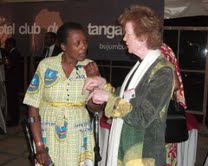
According to a new report by Freedom House, only 1.7 percent of Congolese accessed the Internet in 2012. As the only media outlet where the government does not restrict access or monitor its content, the Internet presents a powerful tool for inclusive dialogue and conflict transformation. While less than two percent of Congolese accessed the Internet last year, the few who did in Bukavu, South Kivu, made a profound difference.
Congolese human rights activist, Neema Namadamu and her “Maman Shujaa” (“Hero Women” in Swahili) use the Internet to exchange ideas and solutions for the transformation of their country with grassroots leaders from around the world. At the Social Good Summit, a three-day conference held in New York, where “big ideas meet new media to create innovative solutions,” Namadamu championed the transformative potential of technology and global networking, citing her group’s use of the Internet for dialogue and mobilization, ultimately sparking the movement to appoint a special envoy to the Great Lakes region.
In November 2012, M23 rebels seized the city of Goma in eastern Congo, intensifying the conflict between the rebel group and the Congolese armed forces, or FARDC. Fed up with continued insecurity and instability, the Maman Shujaa said 'Enough' to the violence. Using the twelve computers in Namadamu’s Internet café, they typed a petition on Change.org addressed to the women leaders in the White House. They implored the United States to immediately appoint a special envoy to address the escalating violence in eastern Congo and the Great Lakes region. With the support of their global network of leaders and activists, the petition quickly gathered over 100,000 signatures and was hand delivered to the White House by actress and activist Robin Wright and Raise Hope for Congo Campaign Manager JD Stier on behalf of the Maman Shujaa. As a result of their movement, the United States appointed Russ Feingold as Special Envoy to the Great Lakes region in June 2013.
In her address to the Social Good Summit on September 22, Namadamu spoke on her personal experiences with the Maman Shujaa and the transformative power of technology, likening the seemingly hopeless case of Congo to her own life living with the effects of polio:
When I got polio everyone would say, ‘No, she’s a lost cause’… They say this about Congo, ‘Don’t talk about Congo, it’s a lost cause.’ But I’m here to tell you today, that with technology, Congo is not a lost cause. My country is like my life.
Many consider Congo unredeemable from the throes of conflict, in the same way many regarded Namadamu as a “lost cause.” But in both cases, Namadamu demonstrates how her life and the life of her country are not lost causes. Technology, she says, empowers those who use it, and this in turn provides hope for Congo. Before, Namadamu was silenced in her situation and limited in her ability to travel. Now, with access to the Internet and participation in global forums, she has an outlet to share her story and virtually travel the globe to broadcast the stories of women in her community. Through their relationships with grassroots leaders around the world, the Maman Shujaa developed collaborative global networks to exchange solutions to conflict and visions for peace.
With only twelve computers, the Maman Shujaa propelled a global movement leading to the appointment of U.S. Special Envoy Russ Feingold and dialogues with U.N. Special Envoy Mary Robinson. Today, Namadamu’s media center remains a rare example of technological innovation and access in Congo. If one center with Internet access can make this kind of impact, one can only imagine how a Congo where thousands of centers could empower people to share their stories, to exchange ideas for change and truly transform Congo. Namadamu says that access to technology is really about access to different opportunities, and that increasing access to global networks gives a voice to thousands still living in silence. Her single Internet café empowers hundreds of women to share their stories, but less than two percent of their fellow Congolese accessed these global conversations last year. Currently, thousands of voices remain silenced by oppression, poverty, and the lack of technology. Through the development of more centers like Namadamu’s Internet café, more voices can be broadcast, creating a “miracle solution” for Congo.
Photo: Mary Robinson with Neema Namadamu (Maman Shujaa)

